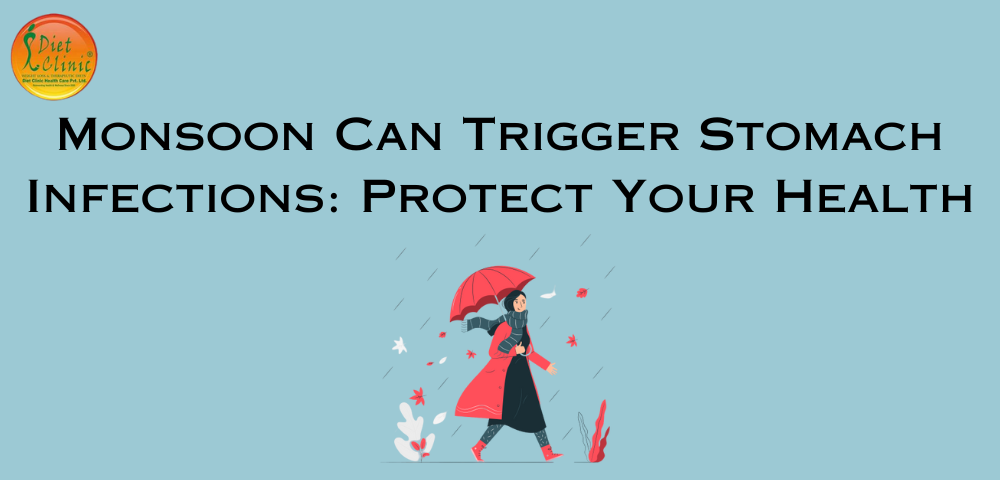
Dietician Sheela Sherawat
Monsoon Can Trigger Stomach Infections: Protect Your Health
As the refreshing monsoon showers arrive, they bring relief from the scorching heat of summer. However, along with the much-needed respite, the monsoon season also brings its own set of health concerns. One common health issue that tends to arise during this time is stomach infections. These infections can be caused by various factors such as contaminated water, unhygienic food practices, and the growth of bacteria and viruses in humid conditions. In this blog post, we will explore how the monsoon season can trigger stomach infections and discuss preventive measures to safeguard your health.
Understanding Stomach Infections :
Stomach infections, also known as gastrointestinal infections, are primarily caused by the ingestion of harmful microorganisms such as bacteria, viruses, or parasites. These pathogens can contaminate food and water sources, leading to illness when consumed. During the monsoon season, the risk of such infections increases due to factors like waterlogging, stagnant water, and compromised hygiene practices. Additionally, the high humidity levels create an ideal environment for the growth and multiplication of these pathogens.
Common Types of Stomach Infections :
* Food Poisoning: Contaminated food, especially street food and improperly stored or cooked food, can harbor bacteria like Salmonella and Escherichia coli (E. coli), leading to food poisoning.
* Gastroenteritis: This infection involves inflammation of the stomach and intestines, causing symptoms like diarrhea, vomiting, and abdominal pain. Viral infections like norovirus and rotavirus are common culprits.
* Hepatitis A: This viral infection spreads through contaminated food and water, resulting in liver inflammation. The monsoon season increases the risk of hepatitis A due to poor sanitation and water contamination.
Preventive Measures :
Taking necessary precautions can significantly reduce the risk of stomach infections during the monsoon season. Here are some important preventive measures to follow:
* Safe Drinking Water: Drink purified or boiled water to ensure it is free from harmful bacteria and viruses. Avoid drinking water from unknown or unverified sources.
* Hygienic Food Practices: Opt for freshly cooked, hot meals. Avoid eating raw or undercooked food, especially seafood and meat. Wash fruits and vegetables thoroughly before consuming them.
* Maintain Personal Hygiene: Regularly wash your hands with soap and water, especially before eating. Use hand sanitizers when soap is not available. Avoid touching your face with unwashed hands.
* Avoid Street Food: While street food may be tempting, it is often prepared in unhygienic conditions. It's best to avoid such food during the monsoon season to minimize the risk of infections.
* Proper Food Storage: Store food items in clean, airtight containers to prevent contamination. Avoid consuming leftover food that has been kept at room temperature for a long time.
* Be Cautious with Waterlogged Areas: Avoid walking through waterlogged areas, as they can be breeding grounds for bacteria and viruses. Use proper footwear to protect your feet from infections.
* Boost Immunity: Eat a balanced diet rich in fruits, vegetables, and whole grains to boost your immune system. Stay hydrated and get enough sleep to maintain overall health.
While monsoons are a delightful time of the year, it's crucial to be aware of the potential health risks they bring. Stomach infections are a common occurrence during this season due to contaminated water and unhygienic food practices. By following preventive measures like drinking safe water, maintaining personal hygiene, and being cautious with food choices, you can minimize the risk of stomach infections. Stay informed, make healthy choices, and enjoy the monsoon season without compromising your well-being.
.jpeg)
.jpeg)
.jpeg)
.jpeg)
